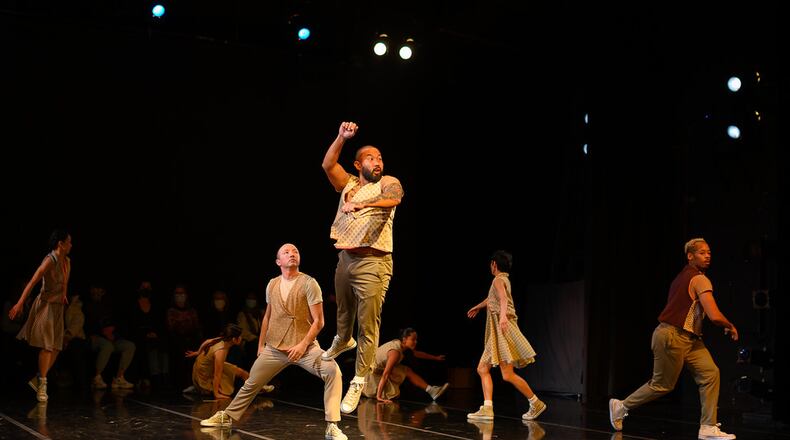This story was originally published by ArtsATL.
When Japanese Americans were taken to internment camps in Manzanar, California, during the Second World War, fragments of memories and hastily gathered keepsakes were sometimes all that tethered these American citizens to their ancestral pasts.
In 1942, by presidential order, more than 125,000 Japanese American lives were dismantled as families were abruptly taken from their homes and placed in euphemistically labeled “relocation centers.” Inspired by this difficult period, “Sankei, a multilayered and thoughtfully developed dance/exhibit/film experience, is being presented at Georgia Tech’s Ferst Center for the Arts.
This union of technology and grit sheds light on powerful stories of Japanese diasporic histories and runs from Sept. 16 through Oct. 27.
Credit: Courtesy of "Out of the Dust"
Credit: Courtesy of "Out of the Dust"
A community-building dance performance by San Francisco-based contemporary dance company Kambara+ kicks off the installation with a work titled “Ikkai Means Once: A Transplanted Pilgrimage” on Saturday, Sept. 16.
“Many senses will be engaged,” choreographer Yayoi Kambara told ArtsATL recently. Given the green light from Aaron Shackleford, the Ferst Center’s former director, Kambara has been developing the project for two years, working with her own company and collaborating with Georgia Tech faculty, staff and students. Kambara was born in Japan and moved to the United States with her family when she was 6.
Credit: Miles Lassi
Credit: Miles Lassi
For those able to attend the weekend performances, “Ikkai” will act as a pilgrimage — a gathering. Though Kambara’s original desire was to deliver the work at an incarceration site, the logistics of such an effort proved to be insurmountable. Regardless, Kambara knew the community should play a role in the work, which is why audiences will be seated onstage at the Ferst, surrounding the dancers as an act of solidarity.
The narrative work will weave together modern dance, Japanese folk dance and a score featuring taiko drumming and will conclude with an invitation to dance with the performers, a celebration of community. Divided into seven distinct sections, “Ikkai” reveals a journey through images borne from the devastation at Pearl Harbor, the abject confusion of people being transported on trains to unknown destinations and the tribulations of camp life. Each component of the work is supported with live music and original poetry.
Credit: Bruce Ghent
Credit: Bruce Ghent
The lobby installation supports the Ferst’s missive to bolster art through futurism, placing technology on equal footing with sensitive subject matter and to unite each element of this prodigious effort. Still, Kambara recognizes the need to tame technology, as it often invades personal privacy and consent practices.
“We are always being monitored via Ring doorbells, security cameras and listening phones,” she said. As such, “Sankei” provides an opportunity to harness technology so that these important stories could flood the senses — on our own terms.
Kambara suggests beginning the experience by entering the west lobby of the Ferst Center to witness “Out of the Dust,” a 17-minute, multigenerational film told through the ghosts of lives that once inhabited the now-barren internment camps. The film, co-created by Kambara and Brian Staufenbiel, sets a somber tone, contextualizing the raw source material for the overall exhibit.
Moving along, audiences will discover reflective activities within the lobby exhibit titled “Ni Do To (Never Again).”
The journey offers an encounter with a “creepy and amazing” prototype of the infamous Zoltar machine of the late 1980s. The pearls-of-wisdom and poetry-spewing fun fair relic will connect audiences with the peculiarities of early technology, while subversively shedding light on how far we have come with gaming and with artmaking. Case in point: Audiences can learn a traditional Japanese dance from a hologram.
Credit: Bruce Ghent
Credit: Bruce Ghent
There are other interactive pieces. One asks participants to fill a digital suitcase with what may feel personally essential for undefined uprooting, while another is dedicated to creating poetry and another perhaps more critical component is a reflection station. Here, one can process, ponder, share thoughts, find a sense of relatability.
“Sankei” lays bare the critical elements of history-derived art and sophisticated technology while underscoring Kambara’s point of view: “We do not want to be stuck in one place.”
Through “Ikkai” as well as the film, Kambara hopes audiences will feel as though they have been invited into a Japanese home — to experience the warmth and generosity that defines her culture.
Taken as a whole, it is likewise a cautionary tale directing thoughts toward the questionable reliability of social safeguards and protective “containers.” Could such an injustice happen again? For Kambara, the question is not necessarily if but, sadly, when.
PEFORMANCE, EXHIBIT, FILM PREVIEW
“Ikkai Means Once: A Transplanted Pilgrimage” performance
4:30 p.m. and 8 p.m. Saturday, Sept. 16. $15-$25. Ferst Center for the Arts, 349 Ferst Drive NW, Atlanta. 404-894-9600, artsgatech.universitytickets.com.
“Ni Do To (Never Again)” exhibit / “Out of the Dust” film
The planned Sept. 18 opening has been postponed due to this week’s flooding. Once they open, the exhibit and film will run through Oct. 27. 9 a.m. to 6 p.m. Tuesdays-Saturdays, except Sept. 30 and Oct. 21. Free. Ferst Center for the Arts lobby. arts.gatech.edu/sankei.
::
Born in Tehran, Iran, George Staib is of Armenian descent. He has lived in the United States since the age of 10, when his family was forced to flee the Iranian Revolution. He is the artistic director of staibdance and a professor of practice in the dance program at Emory University.
Credit: ArtsATL
Credit: ArtsATL
MEET OUR PARTNER
ArtsATL (www.artsatl.org), is a nonprofit organization that plays a critical role in educating and informing audiences about metro Atlanta’s arts and culture. Founded in 2009, ArtsATL’s goal is to help build a sustainable arts community contributing to the economic and cultural health of the city.If you have any questions about this partnership or others, please contact Senior Manager of Partnerships Nicole Williams at nicole.williams@ajc.com.
About the Author
Keep Reading
The Latest
Featured








